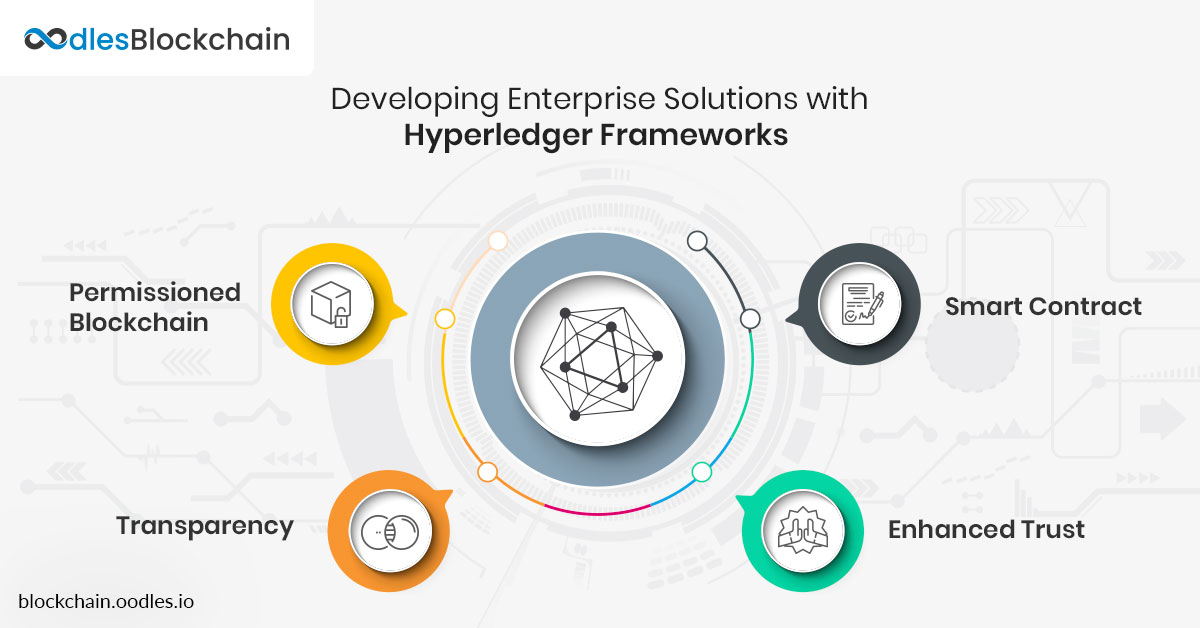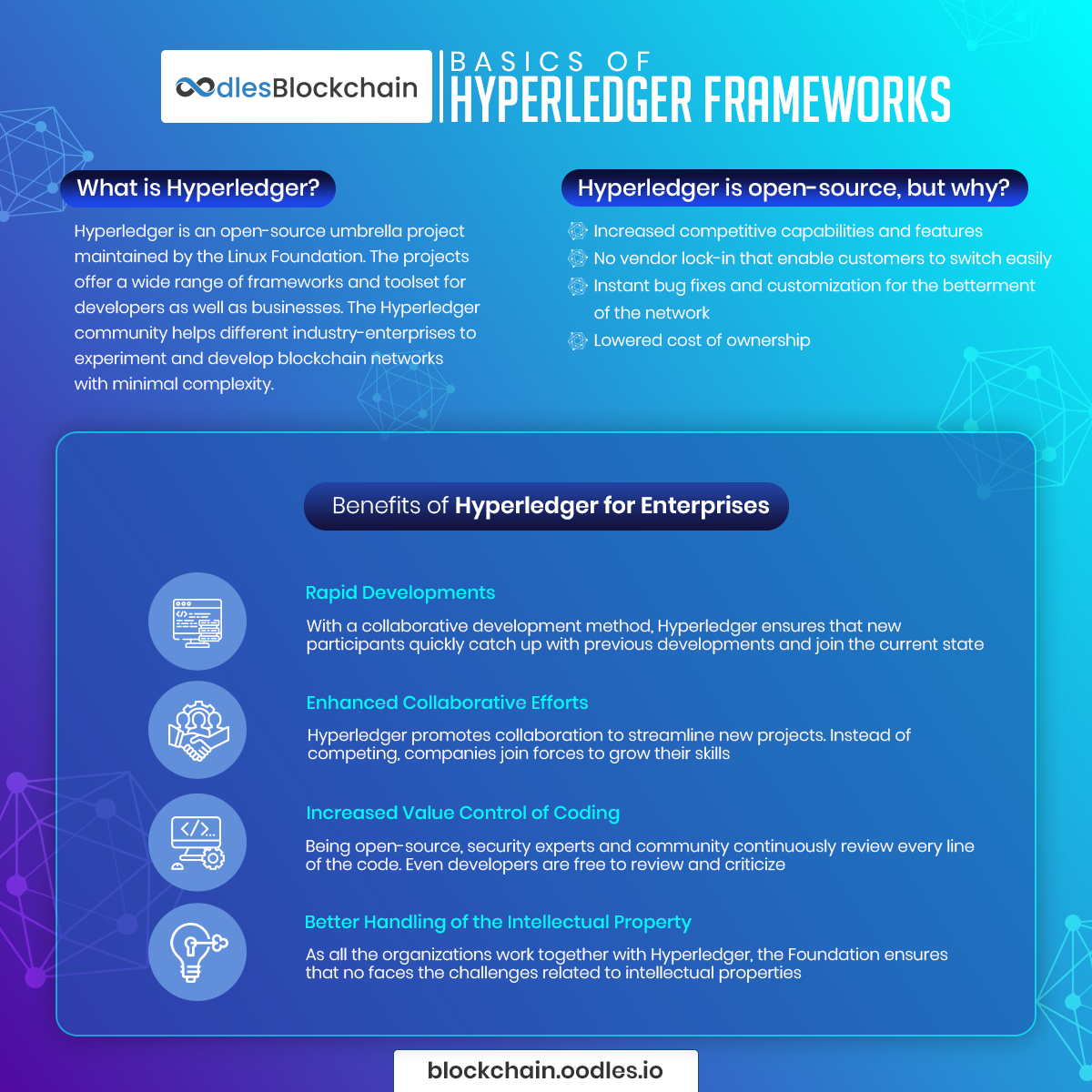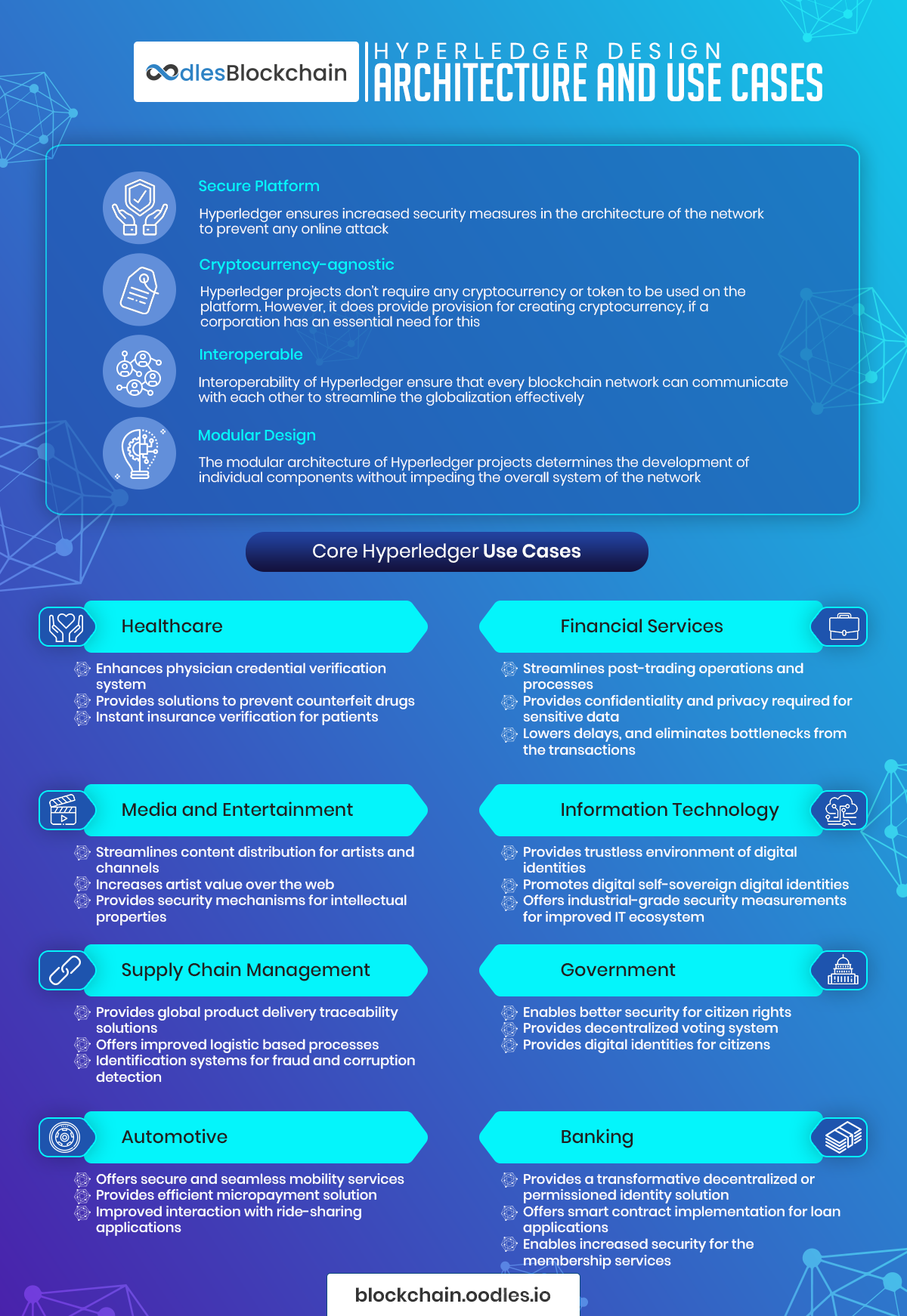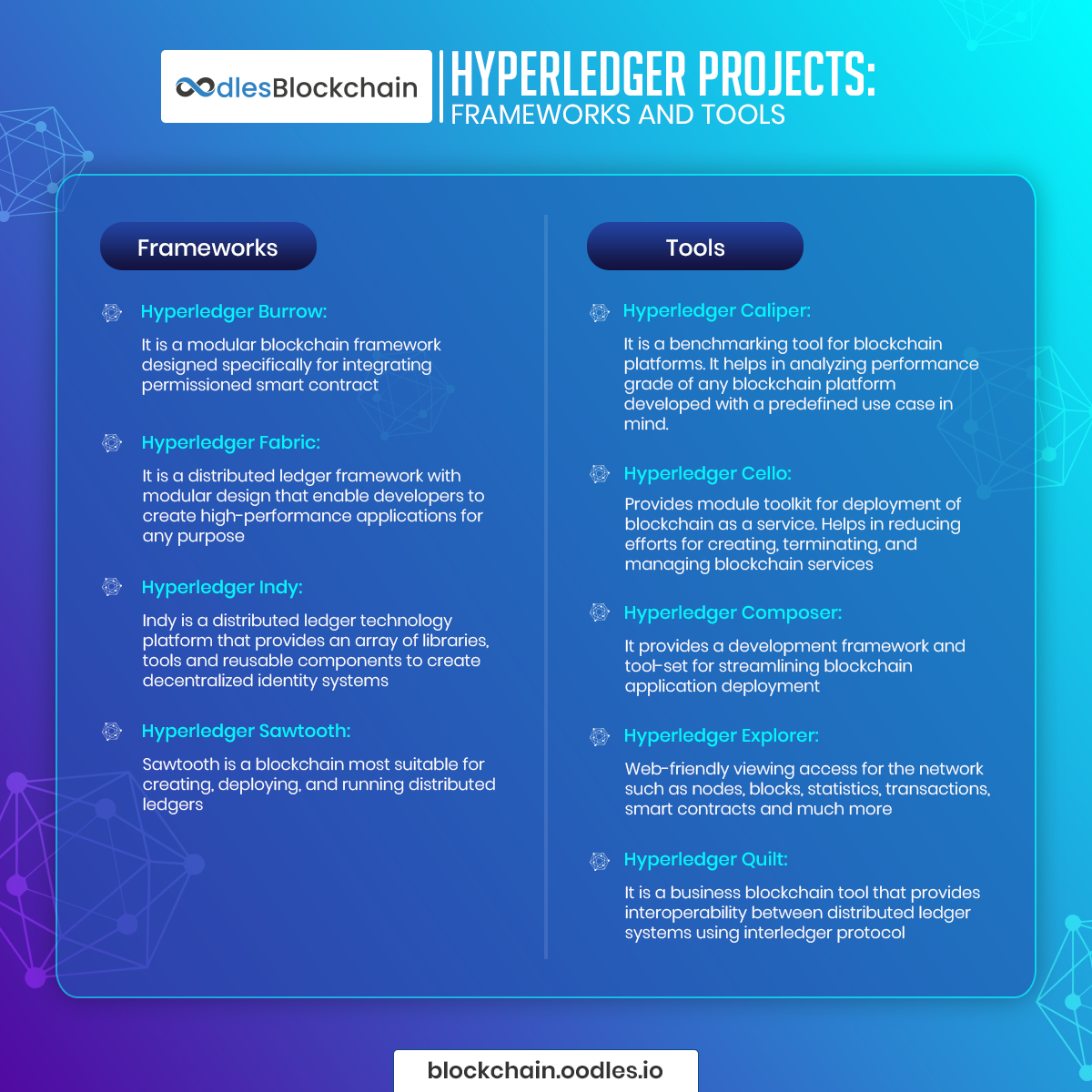-
While entering the distributed ledger technology domain, it is unlikely that you don't get to hear about open source Hyperledger projects. Maintained by the Linux Foundation, they mainly assist in solving the industry-level operational challenges.
Hyperledger: For Enterprise Blockchain Solutions
Although blockchain applications provide diverse industry solutions, they don't fit everywhere. As different organizations have different requirements to satisfy their needs, blockchain cannot serve as a single system. But, Hyperledger provides frameworks and tools to develop blockchain solutions with specific functionality and business rules for every industry's needs.
With Hyperledger Projects Companies Avail These Benefits
Accelerated development
Collaborative environment with clear communication channels reducing research burden for coding or development and enabling quick development of a solution
Improved productivity
Hyperledger greenhouse effect that encourages the use of collaborative research to create more value and productivity
Collaborative method
Collaboration as the priority to avoid the chance of duplication and streamline the overall development. encourages the entire community to work together to achieve interoperability
Better intellectual property handling
Greenhouse architecture consisting of Apache 2.0 license of code and Creative Commons Attribution 4.0 International license to ensure more consistent care of the intellectual property. Both of these licenses safeguard intellectual property and ensure compliance regulations.
Design Architecture of Hyperledger
When a high level of trust in transactions is necessary for an enterprise, private blockchain development provides the required solutions. A permissioned solution restricts anyone to join the network without authorized permission for strengthened security.
When an enterprise requires minimal trust with wide user adoption, a public blockchain solution fulfills its decentralization requirements. A public blockchain network allows anyone to join the network while adding security layers as it expands.
Also Read: Hybrid Blockchain: Bringing the Best of Both Public and Private Blockchains
In this case, Hyperledger projects provide development frameworks and components that easily enable blockchain solutions to meet different enterprise requirements.
Hyperledger projects cover almost every possible use case on the market. They easily meet different enterprise scenarios demanding different functionality and business operations logic that meet their needs. Hyperledger projects provide development frameworks and components that easily enable changes with decentralization, confirmation times, and trust and many other issues.
To cope up with these diverse scenarios, every framework of Hyperledger projects maintains a particular design architecture that includes:
Modular design
Enable developers to efficiently pilot the project without affecting the overall structure of the network.
Extremely secure platform
All projects follow the principles set by the Linux foundation's core infrastructure. Regular audits by security experts of Hyperledger protocols, algorithms and cryptography ensure the security of the network.
Interoperable
Applications and smart contracts are portable for every outside blockchain network to create an interoperable network
Cryptocurrency-Agnostic
All the projects are cryptocurrency-agnostic. They don’t use cryptocurrencies or other tokens on their platforms. However, if a corporation wants to have cryptocurrencies in its blockchain, Hyperledger also has provisions for creating cryptocurrencies on the platform.
Hyperledger Use Cases
Now, let’s explore some Hyperledger use case examples:
Healthcare
Healthcare is the fastest emerging growing Hyperledger use cases. With Hyperledger, this sector can streamline physician credentialing process, and enable hospitals to check whether their doctors are trustworthy.
But, the process is long and leaves various paper trails behind. Another alarming is drug counterfeit in the medical chain. As a result, not only consumers suffer, it also degrades the reputation of the healthcare industry.Hyperledger Indy assists here perfectly
The Hyperledger Indy architecture can easily handle the credentialing issue of physicians for hospitals. It provides safer grounds for developing a network where medical schools can create digital credentials of doctors and upload their verification identities
Similarly, drug tracking can speed up along with the process of an insurance claim with Hyperledger.
Information Technology
With blockchain based self-sovereign identities, everyone can get their ID and control the data in it. It can have profound implications for enterprise and provide significant developments in the IT field
Hyperledger Indy architecture fits here appropriately
The Indy offers to create portable self-sovereign identities coupled with its traditional ways, and more security and cryptography. Users can only bring their ID and use it with any distributed ledger system.
Supply Chain Management
Supply chain management is complex, and every single stage of the chain is a hurdle. From manufacturing to the customers’ door, tracing the progress of the product along its journey becomes essential. Also, various areas of supply chain deal with transactions that are time-consuming and inefficient.
Hyperledger frameworks for improving supply chain management
Here, Sawtooth becomes helpful in managing supply chains. The stakeholders can create a traceability network with every stage of the chain on the ledger. They can also use IoT sensors to record essential information like location, temperature, and other factors of shipping. Sawtooth also uses a smart contract that enables smooth payments at every stage.
Banking
Banks need PII (personally identifiable information) data such as government ID, annual income, birth dates, passport number, and so on to verify users' credit ratings. On the other hand, the process loan application takes up a lot of time. With every new application submission, users risk their personal information to be misused.
But, a platform developed with Hyperledger Indy would enable every applicant to share only the information that validates their identity to the bank. Its architecture enables any activity that includes the exchange of personal information with banks to be executed instantly.
Instead of exposing their PII, users use zero-knowledge proof that can verify if someone is over 21 age or their tax payment passed by a certain threshold. ZK-knowledge can even verify government IDs and credit card information.
Hyperledger Indy architecture provides any company to develop ledger-based identity solutions for increasing trust between multiple parties. A solution that would take consent before sharing the information, and give full control to users over information.
Other Hyperledger frameworks
Hyperledger Burrow can convert loan applications into automatically executable smart contracts that verify business rules and process the loan instantly.
Hyperledger Frameworks, an Overview
BURROW
It follows a modular architecture that provisions for integrating permissioned smart contracts.
FABRIC
It provides a distributed ledger solution with a modular design that enables the development of high-quality applications for any purpose.
INDY
Indy is a distributed ledger platform that consists of various libraries, tools and reusable components helpful in creating decentralized identity-based systems.
SAWTOOTH
Sawtooth is most suitable for running, deploying, and building large distributed ledgers with new consensus protocol – Proof of Elapsed Time.
Hyperledger Tools, an Overview
CALIPER
A benchmark tool to analyze the performance of any blockchain platform developed with a predefined use case in mind
CELLO
Module toolkit for creating terminating and managing blockchain as a service
COMPOSER
A developmental framework and tool-set for streamlined blockchain application deployment
EXPLORER
Web-friendly viewing for the network components such as nodes, blocks, statistics, transactions, and smart contacts.
QUILT
A business blockchain to increase interoperability between distributed ledger systems with Interledger protocol.
Final Words
We are all living in the digital era where everything is connected. In both personal and business life, people demand to stay connected all the time. However, it requires a private, secure, and trustworthy environment, which Hyperledger projects provide efficiently. It is significant, as we also sense from this post, Hyperledger brings creativity and ease-of-use where blockchain and DLTs are solutions for future needs.

Our Offices
INDIA
Emaar Digital Greens, Sector 61,
Gurugram, Haryana
122011.
Welldone Tech Park,
Sector 48, Sohna road,
Gurugram, Haryana
122018.
















